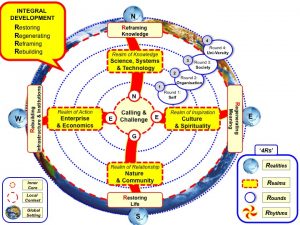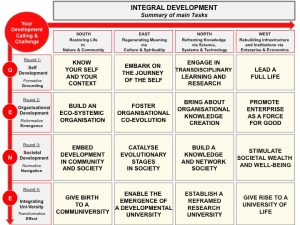Innovation = Regenerating Knowledge | Integral Worlds Theory
Integral Development Theory:
Realising Individual and Collective Transformation
With Integral Development, a groundbreaking development framework and process is introduced to address the most burning issues that humanity faces.
Building up Integral Development
In Integral Development theory we argue that the current development crisis is not only a crisis within the discipline of so-called development studies and/or in the political and economic practice of development. Rather, the overall ineffectiveness of current development theory and practice, as lamented by a large number of renowned international development thinkers and practitioners, is merely one of many symptoms of a profound civilisational crisis humanity as a whole is facing.
Humanity, we believe, is in a transition phase from a modernist, rational, monocultural, capitalist paradigm towards a new evolutionary stage. During this transition time – which, according to the leading US-American sociologist Immanuel Wallerstein, may well last for another few decades – humanity will have to deal with massive disruptions, on all levels. While some thinkers hold that the direction and outcome of such a new evolution is totally unknown, there are a growing number of social philosophers articulating the rise of an Integral Age.
Indeed, all over the world, we can notice attempts to develop more integrated, holistic and balanced perspectives – within scientific disciplines, within various domains of life and within organisations. Local and global movements are promoting ecological balance, sustainable development, gender equality, social justice, cultural unity in diversity, religious dialogue within and in between religious (and non religious) belief systems, equitable livelihoods, inter- and transdisciplinary forms of knowledge creation, peaceful co-evolution of nations and civilisations and more. All these initiatives seek to bring about a more integrated approach, overcoming the highly fragmented and unequal state of our current world.
In the process, the predominant dualistic thought-and-action pattern of the modernist era – which also underlies the distinction between ‘developed’ and ‘developing’ societies – begins to dissolve. We can witness globally a rising awareness that this current evolutionary phase is not any more engaged in ‘tweaking’ existing systems, but rather points towards something fundamentally new.
In a thorough analysis of past and present development discourses we surfaced major disintegrating patterns. In our work, we suggest a set of integrative orientations that need to be included in a new more integrated approach to development, serving to overcome the destructive impact of the existing one. In doing so, we laid the foundation for our approach to Integral Development, building on our prior work on Integral Community, Enterprise, and Economics, Integral Research and Dynamics.
The Integral Development Model: The 4Rs of Integral Development
The four main elements of the Integral Development approach, drawing from our overall ‘Integral Worlds’ approach, are what we called the ‘4Rs’: Realities, Realms, Rounds and Rhythms. These four constituents are dynamically and interactively interwoven.
- Transcultural Realms: Integral Development acknowledges diverse reality viewpoints within each context and across the world. It captures this diversity by differentiating and integrating four archetypal worldviews or realities:
• Southern Relationship based Viewpoint on Reality
• Eastern Inspiration based Viewpoint on Reality
• Northern Knowledge based Viewpoint on Reality
• Western Action based Viewpoint on Reality
Altogether these realities relate to a rich variety of typological and structural patterns across civilisations.
- Transdisciplinary Realms: Each reality viewpoint has a different emphasis, which leads to four different knowledge fields or realms, each providing a particular perspective. Any given development calling & challenge requires the transdisciplinary engagement with all realms:
• Southern Realm of Relationship: Nature & Community
• Eastern Realm of Inspiration: Culture & Spirituality
• Northern Realm of Knowledge: Science, Systems & Technology
• Western Realm of Action: Enterprise & Economics
- Transpersonal Rounds: Each particular development calling & challenge is to be followed through (or: fully ‘rounded out’), traversing each realm via four interconnected rounds:
• 1st Round of Self Development
• 2nd Round of Organisational Development
• 3rd Round of Societal Development
• 4th Round of Uni-Versity Development
- Transformational Rhythms: Realities (worldviews), realms and rounds are altogether aligned with and are hence subject to fourfold transformational rhythms:
• Southern formative and grounding (G)
• Eastern reformative and emerging (E)
• Northern (newly) normative and navigational (N)
• Western (fully) transformative and effecting (E)
These rhythms stimulate and enable dynamic and interactive processes towards authentically addressing the development calling & challenge at hand. They are designed to release the GENE-ius of a particular self, organisation, community & society.
The interactive and dynamic engagement of all ‘4Rs’ with a specific, central development calling and challenge, lodged within a particular local context and global setting, is reflected in the circular, integral framework of Integral Development

Having laid out the full architecture of the Integral Development model, we now introduce the full terrain of Integral Development, including compass and travel maps.
The Integral Development Terrain
Each reality viewpoint informs a specific realm or knowledge field. Each of the four realms is underpinned by a particular theme. For example, the main development theme underlying the southern realm of relationship with its perspectives of nature and community is expressed as ‘restoring life in nature and community’. Then, each realm contributes to the realisation of a specific guiding value reflecting the full potential of the realm. For example, the ‘northern’ realm of knowledge with its perspectives of science, systems and technology is underpinned by the value of ‘open and transparent knowledge creation’. These main themes and core values, inform the integral journey.
- Southern Reality and Realm of Relationship
Main Theme: Restoring Life in Nature & Community
Core Value: Healthy & Participatory Co-Existence
- Eastern Reality and Realm of Inspiration
Main Theme: Regenerating Meaning via Culture & Spirituality
Core Value: Balanced & Peaceful Co-Evolution
- Northern Reality and Realm of Knowledge
Main Theme: Reframing Knowledge via Science, Systems & Technology
Core Value: Open & Transparent Knowledge Creation
- Western Reality and Realm of Action
Main Theme: Rebuilding Infrastructure and Institutions via Enterprise & Economics
Core Value: Equitable & Sustainable Livelihoods
In order to fully actualise the potential of the four realities and realms, the Integral Developer needs to gradually engage with all four rounds of individual, organisational, societal, and Uni-Versity development, dynamically led by the integral development rhythms that we introduced earlier.
With these four rounds (self-organisation-society-Uni-Versity) rhythmically associated with each of the four (southern, eastern, northern and western) realities and realms, we came up with a travel map in a matrix form that encompasses 16 fields, that is four rounds and rhythms for each of the four reality viewpoints and realms.
To navigate the Integral Development journey we developed a travel map with guiding questions, providing orientation.

Engagement Map with Guiding Questions
The developmental tasks in each realm always starts with the individual round, to then successively round out organisation, society and Uni-versity in turn. While the Integral Developer may start this journey on his or her own, s/he would thereby be guided to gradually engage your particular context – concretely with a group, organisation, community and society.
In each realm we link theory and practice. While on the first three rounds (self, organisation and society) we focus primarily on relevant theory, in the final round we emphasise the integration of that theory through new practice. We illustrate such new practice through inspiring case stories from all over the world. Each of these cases, however, embodies not only an integrated organisation or community, it also represents a new educational-developmental space, that we coined a ‘Uni-Versity. We argue, that for each integral reality-and-realm to be fully actualised, such new ‘Uni-Versities’ would need to be established. Why? Because such institutionalisation would then promote the development of new integral development theory and practice in a way that it can be ‘universally’ shared, while at the same time being lodged in a particular context. Without such a conscious articulation through a ‘Uni-Versity’, the danger is that the particular knowledge and consciousness generated in a given case as well as its practice would not developmentally inform and transform society at large. That has been our repeated experience.
The concluding Figure shows the Integral Development Map with its 16 fields, now presenting the major developmental task in each field. This culminating map introduces the core challenges of the full Integral Development journey – challenges, that, with the help of Integral Development theory, can be addressed holistically.

Summary of Main Development Tasks
Note: This is a summary of our book Schieffer & Lessem (2014). Integral Development: Realising the Transformative Potential of Individuals, Organisations and Societies
